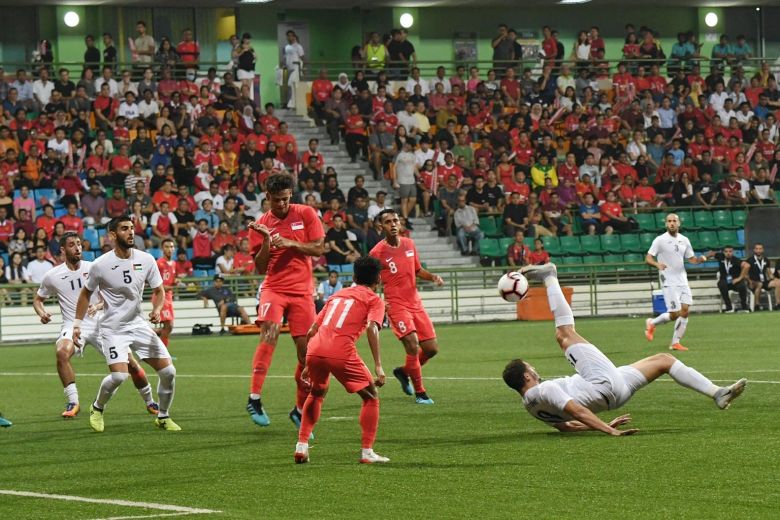
There is no use crying over spilled milk and that is exactly what Palestine’s unexpected loss to Singapore is. A missed opportunity. It will not put the nail in Al-Fida’i’s qualifying hopes and if anything, the other result in the group- Yemen’s 2-2 draw against Saudi Arabia- has flung the gates wide open in Group D.
The question on everyone’s minds is- how did this team beat one of Asia’s best sides and then promptly proceed to lose to Singapore?
While no amount of whining will bring back the points that were lost last Tuesday- some analysis and introspection might allow Palestine not to repeat the same mistakes. Many of those mistakes were self inflicted and the final score could have been different if mistakes were corrected during the game itself.
No Plan B
Palestine beat Uzbekistan with a set of instructions that often saw them bypass the midfield. This tactic was effective for a number of reasons, first and foremost, Uzbekistan’s formidable midfield was not allowed to develop a rhythm. Secondly, Uzbekistan had shown an ability to pounce on mistakes in the center of the pitch, transitioning to attack with the long range passing ability of Odil Akhmedov. Finally, Palestine wanted to exploit the Uzbek fullbacks who were correctly identified as the weakness of Hector Cúper’s side.
The team also had reserves of energy to play this way and Palestine outran a side they willingly ceded possession to. Uzbekistan had 64% percent of the possession (a rarity for a Hector Cúper led side) but only created one truly dangerous chance throughout the duration of the match. Their attack was nullified by the diligent pursuit of the two Mohammeds in midfield- Darweesh and Rashid.
Agaisnt Singapore, the national team was faced with a completely different team. Uzbekistan rarely pressed on Match Day 1. Singapore on the other hand had pressed Yemen effectively and were expected to do the same against Palestine.
Palestine were ill-prepared for this and it was evident throughout the games first 10 minutes. The instructions from the coaching staff should have been to survive the early onslaught; that might have meant playing some unsexy football, foregoing building attacks from the back, and instead hoofing the ball forwards (Palestine would do this just not at the right times- more on that later).
The first goal was an individual error from Abdelatif Bahdari. There were other factors at play- perhaps the artificial and overwatered pitch affected the weighting of the pass but the captain could have cleared, or played back to his goalkeeper, or it could just be that asking a 35 year old to play twice in five days will naturally result in a downturn in form come the second game.
A disastrous start was met with the perfect response. An equalizer 10 minutes later should have restored order, but Palestine was weirdly insistent on lumping the ball through the air. It was simultaneously painful and exhausting to watch. When Palestine conceded from a corner kick the strategy remained the same. The coaching staff confusingly withdrew their big target forward only to send up a 35 year old centre back to act as a forward for the final 15 minutes.
That forward-Mahmoud Wadi- registered his 12th game with the national team and the fact that he has yet to score has not gone unnoticed by the fans. It is important to mention however that he is not being utilised correctly. Asking any forward to chase down a ball over and over again will most likely yield paltry results- especially when said forward does not possess blinding speed. A man who can score a hat trick in the African Confederations Cup belongs in the national team and should play but there has to be a strategy that enables him and empowers the players around hi,.
It was almost if the coaching staff formulated a game plan based on the stereotype that Southeast Asian teams are weak and could be bullied in the air. Singapore’s starting backline was made up of Shakir Hamzah (180 cm), Irfan Fandi (189 cm), Safuwan Baharudin (183 cm), and Amirul Adli (180 cm). While by no means imperious, this back four was not going to have trouble clearing a ball played from 40 yards away. When the Singaporeans demonstrated their competence in this phase of the game there should have been a change in strategy. Either 30 minutes in, or at halftime, or on the hour mark.
That change did not come.
Failing to exert control
Any successful team can win games while not playing their best football. Palestine has some experience with this but it is scant. During standalone Asian Cup Qualifying, Palestine did this against Maldives. It was not pretty to watch for 60 minutes but by maintaining possession, Palestine dictated the terms of the game and Maldives had no way of causing any damage. It was literally all about getting a simple win and Ahmed Maher came off the bench to get the job done with a quick fire brace en route to a 3-0 win.
At 1-1, Palestine needed to spend the rest of the first half exerting control. If they could keep possession, they could afford to exert themselves less, and chip away at Singapore’s confidence. Indeed, after the equaliser Nazmi Albadawi fed Mahmoud Wadi on a brilliant through pass only for the striker’s chip shot to be deflected for a corner kick. Palestine were dangerous when they kept the ball on the ground- why they were instead urged to boot the ball forwards- neutralizing their skillful attacking players remains a mystery. Instead of dominating proceedings- possession was evenly split 52% in favour of Singapore.
The game before the game
World Cup qualifying in Asia is a dogfight. It is part of why the qualification tournament is more exciting than its counterpart in Europe or Africa. It also necessitates careful planning that takes into account a multitude of factors that could potentially affect the outcome of a match.
Due to events that were slated for the weekend before the match, Singapore decided to play against Palestine on the artificial pitch at Jalan Besar. Palestine could have protested this switch- it might not have yielded success- but an FA cannot leave a stone unturned in the pursuit of victory and pursuing its players interests.
That said, many of Palestine’s traveling contingent are by and large not experts in their field. The head of delegation- Sab’e Kokash is a former prison doctor known for his love of smoking, the media officer has no background in media and cannot speak English, and many of the equipment managers are in the role because they hail from the same village as Jibril Rajoub.
So it is not surprising that they would not think to lodge an official complaint in regards to the pitch. It is also no surprise that they somehow managed to pick a bad restaurant in Singapore- the capital of good eating. The restaurant was so bad, that many of the players fell ill after dining there.
Rotations- or lack thereof
Even if money was spent correctly by the PFA it is hard to imagine that the team would have access to the first class travel and sports science that are at the disposal of the big dogs in the region. That said, the best recovery plan was never going to rejuvenate players after a Herculean performance vs. Uzbekistan.
A sensible policy of rotation could help protect against the factors of jet lag, exhaustion, and an unforgiving turf surface.
Playing an unchanged lineup was a peculiar choice and it was evident early on. Singapore had lots of joy down Palestine’s right flank, manned by Musab Al-Battat and Tamer Seyam were so visibly bereft of energy. The midfield was not as tenacious as it was against Uzbekistan and there was always a fear that midfield lynchpin Mohammed Darweesh could pick up another yellow card and miss the match against Saudi Arabia (he did).
It is maddening to think that capable substitutes were left on the bench. Musa Farawi held his own against good teams in the WAFF Championship last month and could have spelled Al-Battat. Mahmoud Eid and Mahmoud Abu Warda were fresh and raring to go and could have played on the right flank. Shadi Shaban has the experience and knowhow to play these types of games but he went unused as well.
With Saleh Chihadeh departing the squad, there was only one true forward in the team and Noureddine Ould Ali decided not to call in Yashir Islame a player with seven goals for the national team in 18 caps (15 starts). To add insult to injury, Islame was an hour away in Malaysia and could have hopped the Johor Straits for the game.
There were other interesting alternatives such as the in-form Ahmed Awad- scorer of six in his last four matches who could have provided a spark when the team was down 2-1.
A quick look at the most successful teams over the two match days reveals Tajikistan and Korea DPR made three changes apiece to their starting lineups en route to a 100% record. Bahrain- another #3 seed punch above its weight- got a credible draw vs Iraq on Match Day 1 and then made five changes before traveling to Phnom Penh and getting a 1-0 win over Cambodia.
Any team that harbors ambitions of getting to a World Cup will need to utilize a deep pool of players and squad management is an oft overlooked but incredibly crucial part of running a national team.
Conclusion
This was an imperfect storm in many aspects. Some of the damage was self inflicted and the rest is down to the nature of playing qualifiers in Asia. Perhaps if the game was on a natural pitch, or officiated by a better referee Palestine would have something to show for their efforts. Despite playing at a subpar level there were opportunities to grab a point in the second half.
As mentioned before however the result is not down to the pitch or the poor refereeing or bad luck but more down to bad planning logistically and tactically. One should also not forget to credit Singapore for playing well, sticking to their game plan, and converting their chances.
The road to Qatar 2022 is long and winding and Palestine’s chances are still very much alive. Al-Fida’i will play two games in five days on two more occasions- in November (away to Yemen, away to Uzbekistan) and June (away to Saudi Arabia, at home to Singapore) and the lessons learned here have to be applied.
Next up is a game against a Saudi Arabia side that is vulnerable and in the midst of a transition between generations and playing philosophies. If Palestine want to advance to the next round of World Cup qualifying it is absolutely imperative they get something- preferably a win- out of this game.




